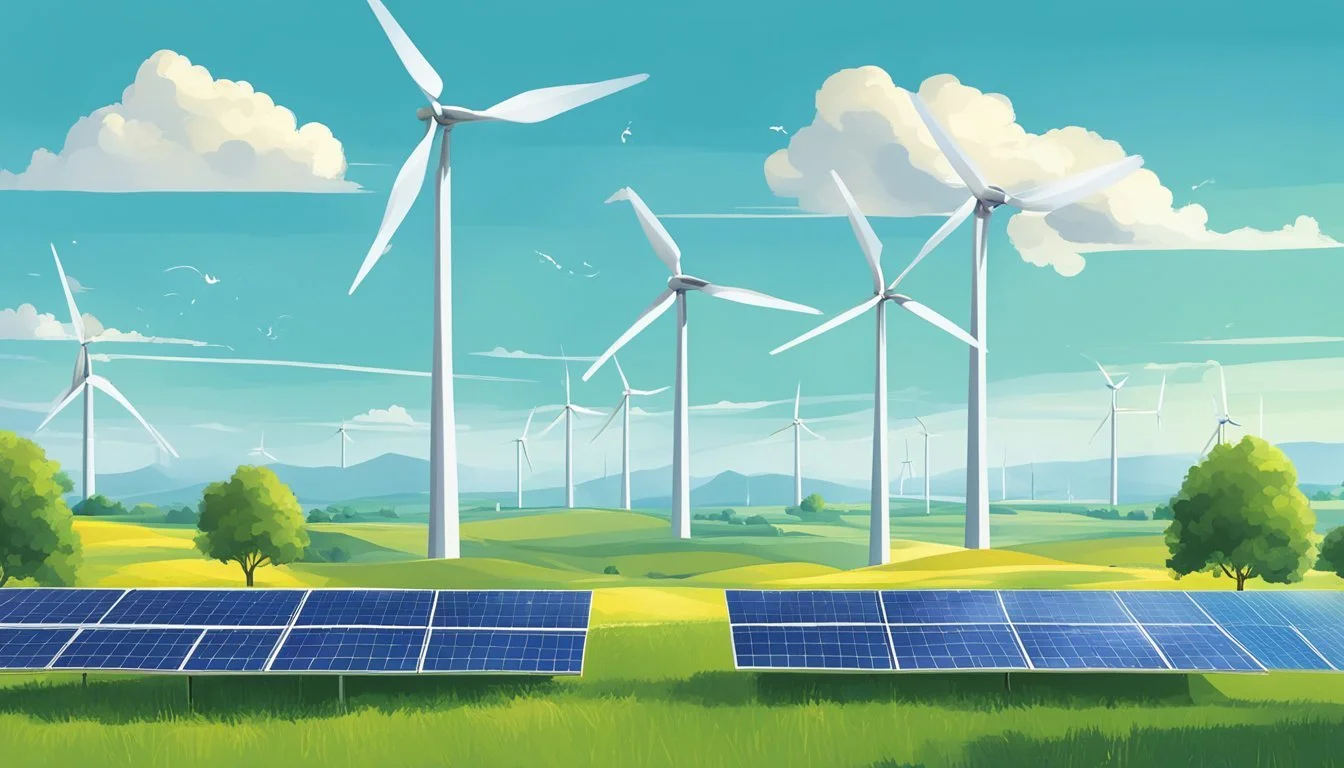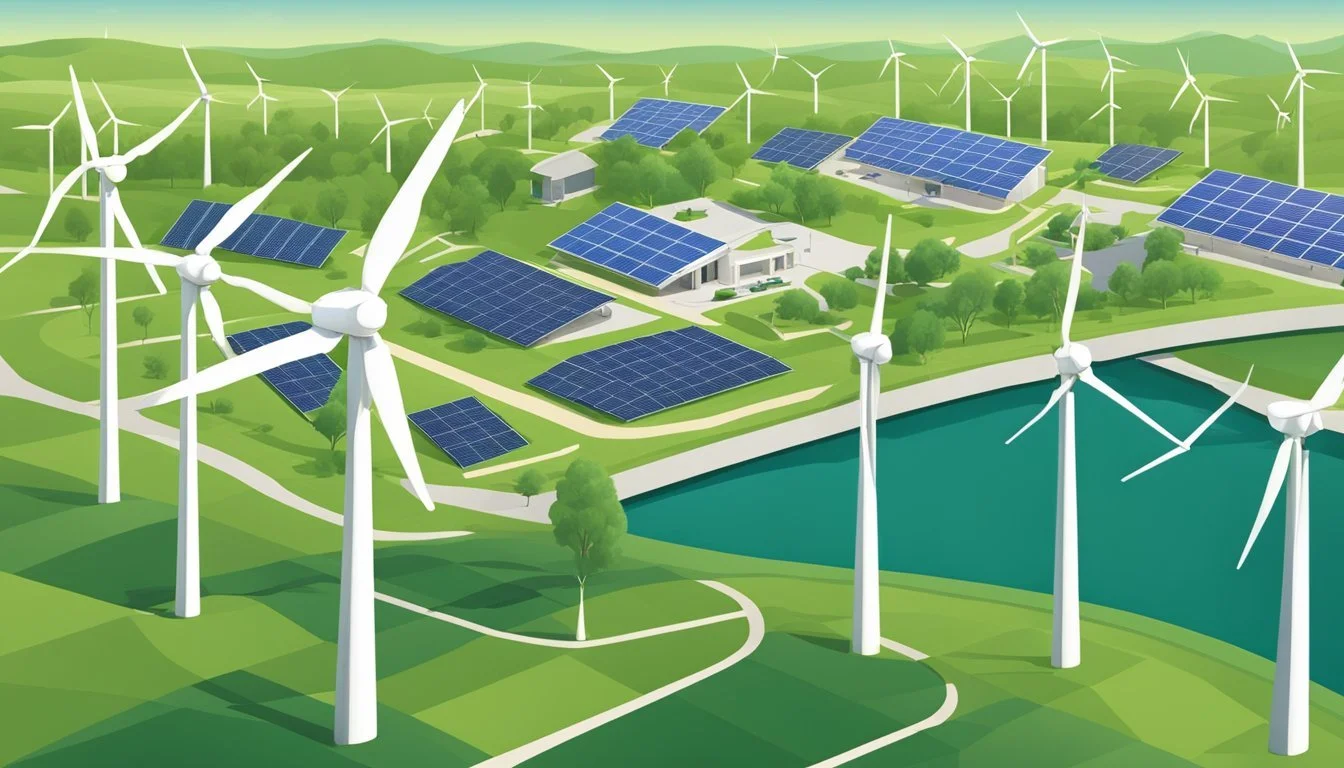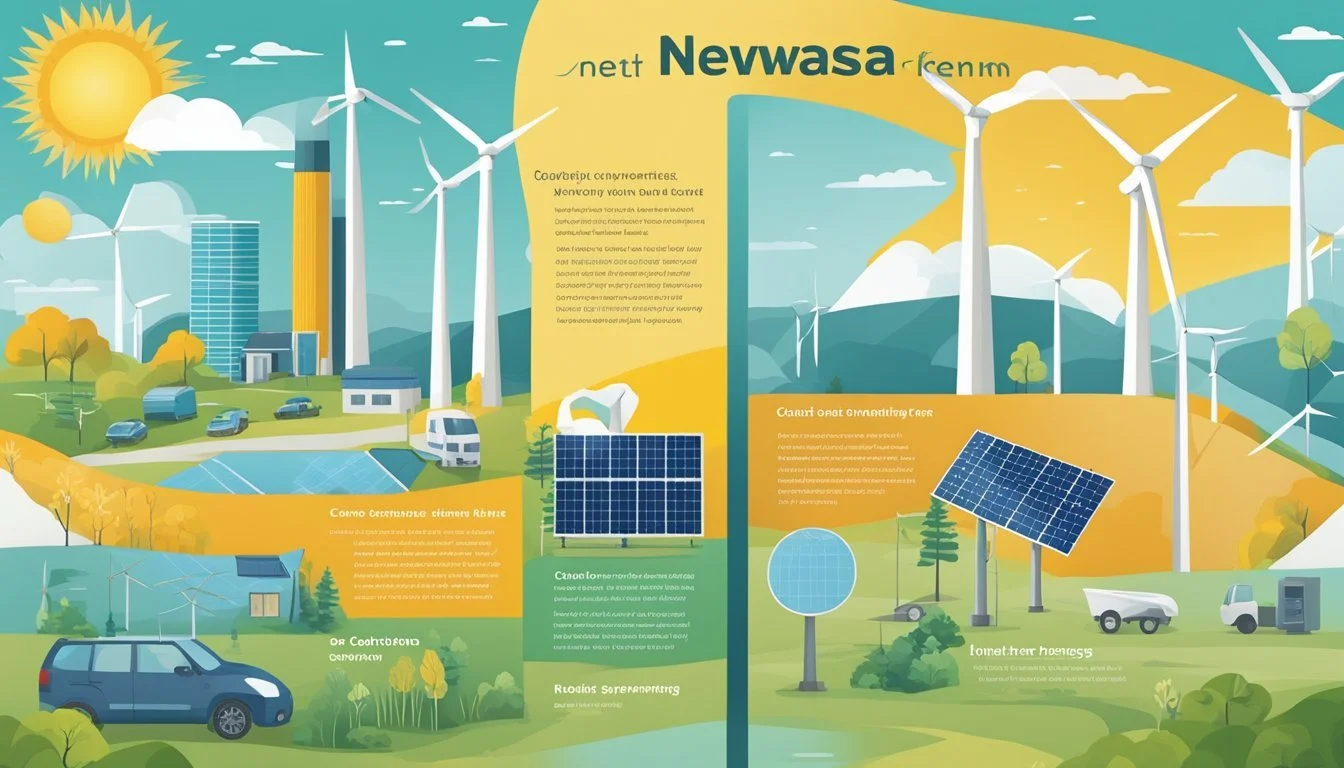Incentives for Renewable Energy and Conservation in Nebraska
Exploring State Support Mechanisms
Nebraska has taken proactive steps towards promoting energy efficiency and the use of renewable sources of energy. By updating the Nebraska Energy Code from the 2009 IECC to the 2018 IECC and adopting ASHRAE 90.1-2016, introductions were made to rigorous standards aimed at enhancing energy savings for both new constructions and renovations. This shift towards modern standards showcases Nebraska's commitment to reducing energy consumption and supporting the green building movement.
In addition to policy updates, Nebraska offers incentives for renewable energy and conservation efforts. The Nebraska Dollar and Energy Saving Loans (DESL) Program stands out as a significant initiative, offering low-cost financing to encourage high-efficiency retrofit projects and the adoption of renewable energy systems across the state. These approaches align with the state's broader goals of promoting sustainability and environmental stewardship.
Collectively, the array of programs available demonstrates Nebraska’s integrated solution to energy challenges. Through administration, program planning, and financial management, Nebraska supports a variety of activities that significantly contribute to energy conservation and the proliferation of renewable energy installations. Residents and businesses alike are encouraged to participate in these programs to not only benefit from financial savings but also participate in the state's sustainable development agenda.
Energy Landscape in Nebraska
Nebraska's energy landscape is a dynamic field marked by its current energy mix and the untapped potential for renewable energy sources.
Current Energy Usage and Statistics
Nebraska primarily generates its electricity from a mixture of coal, natural gas, nuclear power, and renewable energy resources. The state has made significant strides in diversifying its energy portfolio. Comprehensive energy statistics reflect that coal-fired plants, while still a major part of energy production, are gradually being complemented by renewable energy sources such as wind power.
Electricity: Generated from multiple sources with a recent increase in renewables.
Natural Gas: Used for residential heating and electricity generation but less so than the national average.
As of the latest reports, Nebraska's reliance on renewables is growing, influencing the state's strategy towards a more sustainable energy future.
Renewable Energy Potential in NE
NE's potential for renewable energy is particularly noteworthy in the domain of wind and solar power. The state boasts significant:
Wind Energy Potential: Class 4-7 wind resources, particularly in the Sandhills.
Solar Energy Potential: Average of about 4.5 to 5.5 kilowatt-hours per square meter per day.
These natural resources position Nebraska as a key player in the transition towards clean energy, with initiatives underway to further explore and exploit this potential. The adoption of renewable energy in Nebraska is not only a sustainable move but also a strategically important one, given the state's geographic advantages for wind and solar power generation.
State Incentives and Programs
Nebraska provides a variety of programs and incentives targeted towards the promotion of renewable energy and the enhancement of energy efficiency. These offerings include financial support and regulatory updates that collectively aim to foster an environment conducive to sustainable energy solutions.
State Energy Program Overview
The State Energy Program in Nebraska is designed to assist in the development and implementation of renewable energy and energy efficiency projects. This program is key to the state's efforts in reducing energy costs and improving the reliability of its energy systems.
Dollar and Energy Saving Loans
Through the Dollar and Energy Saving Loans program, Nebraska offers low-cost loans to individuals, businesses, and organizations. These loans are aimed at financing energy-saving improvements and renewable energy projects, effectively reducing the financial barriers to energy efficiency investments.
Nebraska Energy Code Updates
Updates to the Nebraska Energy Code reflect the state's commitment to reducing energy consumption in new buildings and renovations. These codes are periodically updated to ensure that they meet current energy efficiency standards, providing a regulatory framework that supports energy conservation efforts.
Federal Support and Funding
Nebraska has received substantial federal support and funding for renewable energy and conservation initiatives, focusing on grid resilience, energy efficiency, and workforce development.
Inflation Reduction Act Benefits
The Inflation Reduction Act substantially bolsters Nebraska's energy programs with estimated funds of approximately $91 million from IRA formula funds. These funds target renewable energy technologies and energy conservation, supporting the state's commitment to reducing its carbon footprint and transitioning to more sustainable energy sources.
U.S. Department of Energy Initiatives
The U.S. Department of Energy (DOE) plays a pivotal role in Nebraska's energy landscape. Through initiatives like the State Energy Program (SEP) and the Weatherization Assistance Program (WAP), the DOE has provided Nebraska with funds exceeding $5.1 million for SEP and $25.4 million for WAP since 2015. These initiatives have led to 1,654 homes weatherized and the creation or retention of 409 jobs, demonstrating a direct impact on the state’s economy and environmental stewardship.
Improving Home and Business Energy Use
Nebraska's initiatives for enhancing energy efficiency span across residential and commercial sectors, focusing on practical steps to reduce consumption and costs.
Residential Energy Efficiency Improvements
Homeowners can benefit from various programs designed to improve energy efficiency. These include rebates for upgrading to Energy Star appliances, enhancing insulation, and installing energy-efficient windows. For instance, the Home Energy Rebates Programs provide substantial support for upgrading home insulation, which reduces energy bills by minimizing heat loss in winter and heat gain during summer.
Insulation: The addendum of high-quality insulation in key areas such as attics, walls, and floors is a critical enhancement for Nebraska homes, leading to significant energy conservation and cost savings.
Air Conditioning: Efficient air conditioning systems are another focal point, with incentives for installing high-efficiency units that lessen the overall electricity demand.
Commercial Energy Conservation Measures
Businesses in Nebraska are encouraged to adopt energy conservation measures through a combination of financial incentives and technical assistance. This assistance aims to help businesses identify and implement changes that lead to long-term energy savings.
Energy Audits:
Assessment of current energy use to highlight efficiency opportunities.
Customized solutions to optimize operations and energy consumption.
Upgrades:
Incentives for retrofitting and upgrading to energy-efficient equipment.
Implementation of modern heating, ventilation, and air conditioning (HVAC) systems designed to lower energy usage and improve indoor air quality.
Investing in these improvements not only lowers operational costs but also enhances the sustainability of Nebraska businesses.
Energy Efficiency Resources
In Nebraska, residents have access to robust programs aimed at improving energy efficiency and reducing overall consumption. These resources offer practical solutions for households seeking to optimize their energy usage and benefit from cost savings.
Weatherization Assistance
The Weatherization program in Nebraska provides low-income families with services to enhance the energy efficiency of their homes. By implementing measures like adding insulation and sealing leaks, energy bills can be significantly reduced. These improvements not only lower costs but also improve the comfort and health of the living environment.
Energy Management and Audits
For a more proactive approach to energy savings, Nebraska offers services in Energy Management and energy audits. These initiatives assist homeowners and businesses in assessing how energy is used and identify ways to increase efficiency. Through a detailed audit, energy-wasting issues can be pinpointed and rectified, leading to sustained energy conservation and financial savings. For further information or to initiate steps towards energy efficiency, interested parties are encouraged to Contact Us.
Sustainable Economic Growth
In Nebraska, renewable energy initiatives are fostering sustainable economic growth, with a concentrated focus on job creation and energy cost management. The deployment of renewable energy sources is key to both economic stability and innovation in the state's job market.
Job Creation and Workforce Development
Renewable energy projects in Nebraska have made significant strides in job creation, leading to an increasing demand for a skilled workforce. The growth of the wind energy sector, for example, has not only generated jobs in the construction and maintenance of wind farms but also in the manufacturing of component parts. Workforce development efforts have scaled up through training programs to ensure that the local talent pool can meet the industry's needs. Initiatives like these address the state's concern over young people leaving and the decline of rural communities by providing locally-sourced employment opportunities that also drive economic growth.
Energy Cost Reduction and Market Stability
By investing in renewable energy, Nebraska sets the stage for energy cost reduction and market stability. The adoption of wind farms has leveraged Nebraska's natural wind resources, aiming to stabilize energy markets and reduce dependency on non-renewable sources, which are subject to price volatility. The Nebraska Energy Office's implementation of State Energy Program funds showcases a clear strategy to promote energy efficiency and renewable energy priorities. These policies are aimed at long-term energy affordability and resilience, which are paramount for household budgets and business operating costs across the state.
Energy Policy and Legislation
Nebraska's energy policies are informed by a combination of federal guidelines and state-specific initiatives aimed at promoting energy efficiency and the adoption of renewable energy sources. The state adheres to recognized energy codes and enacts legislation to support these goals.
International Energy Conservation Code
Nebraska has adopted the International Energy Conservation Code (IECC) to establish minimum design and construction requirements for energy efficiency in buildings. The IECC serves as a benchmark for energy-efficient buildings, ensuring reduced energy consumption and incorporating sustainability into the built environment. Compliance with these codes is mandatory for new constructions and major renovations, contributing to Nebraska's commitment to energy conservation.
State Energy Policy Initiatives
State-level policy initiatives in Nebraska underscore support for renewable energy projects and seek to enhance energy efficiency across various sectors. Legislation often includes incentives such as tax exemptions, loans, and grants to encourage the implementation of energy-efficient practices. For instance, Nebraska's energy office promotes programs that aim to reduce energy consumption in residential, commercial, and industrial settings. These initiatives not only pave the way for cleaner energy production but also support economic growth within the state by fostering local industries related to renewable energy and conservation.
Outreach and Educational Resources
Outreach and educational initiatives in Nebraska are instrumental in furthering knowledge of renewable energy and conservation. These programs leverage various platforms to disseminate information and involve local energy offices, ensuring available resources are communicated effectively through seminars and public campaigns.
Informational Workshops and Seminars
Nebraska's energy offices conduct numerous informational workshops and seminars throughout the year. They cater to a broad audience, ranging from industry professionals to homeowners interested in energy conservation and renewable energy options. Attendees receive detailed packets of information, which they can review at their leisure or use for further inquiry via email.
Topics covered: Often include climate-smart agriculture, renewable energy adoption, and energy audits.
Format: Sessions typically feature presentations from experts, Q&A segments, and networking opportunities.
Contact Information: Organizers usually provide email addresses for further questions or reporting feedback on the workshops.
Public Awareness Campaigns
To create a widespread understanding of renewable energy and conservation, public awareness campaigns are essential. These campaigns are designed to educate the general public on how embracing renewable energy can positively impact both the environment and personal finances.
Methods Used: Include social media blasts, informational billboards, community events, and local media partnerships.
Goals: Aim to increase knowledge about incentives, such as financial rebates for solar energy installation, and impart practical advice on energy efficiency.
Official Reports: Campaign results are documented and reported back to the energy offices to assess efficacy and inform future strategies.
Utility Programs and Partnerships
Utility programs and partnerships in Nebraska are crucial for advancing energy efficiency, renewable energy, and sustainability goals. These initiatives often focus on the practical benefits of affordability, resiliency, and reliability of energy services.
Nebraska Public Power District Initiatives
The Nebraska Public Power District (NPPD) offers a variety of programs aimed at enhancing energy conservation and promoting the use of renewable energy. For residential customers, NPPD provides incentives for home energy audits which can lead to significant savings on utility bills. They also support the adoption of renewable energy sources by offering rebates for residential solar panel installations. This not only helps homeowners save money but also contributes to the overall reliability and resiliency of the power grid in Nebraska.
Collaborations for Energy Independence
In its pursuit of energy independence, Nebraska has seen several partnerships between public entities, private businesses, and non-profit organizations. These collaborations are fostering a supportive environment for renewable energy projects that are both affordable and reliable. For instance, local utilities work together with governmental agencies to secure grants and funding opportunities for community-based energy projects, which can range from wind farms to biomass facilities. These strategic partnerships are not only key to Nebraska's long-term energy planning but also ensure that renewable energy benefits are widely distributed across the state.
Contact Information
For individuals and organizations interested in Nebraska's incentives for renewable energy and conservation, the primary point of contact is the Nebraska Department of Environment and Energy (NDEE). The NDEE is responsible for the management and dissemination of information related to energy programs within the state.
In Lincoln:
Email: Energy & Assistance Division
Phone: (402) 471-2867
Postal Mail:
Nebraska Department of Environment and Energy
Planning & Aid Division
P.O. Box 98922
Lincoln, NE 68509
In Omaha:
Local initiatives and programs in Omaha may have specific contacts. Individuals are encouraged to visit the Omaha city website or contact the local government offices for more information.
Statewide Contact Methods:
General Inquiries:
Phone: (877) 253-2603
Fax: (402) 471-2909
For more detailed information regarding specific energy programs such as Weatherization or the Nebraska State Energy Program, individuals can navigate directly to the respective sections on the NDEE's official website.
The NDEE also offers online forms and detailed FAQs for those seeking quick answers to common questions. It is recommended to reach out during standard business hours, which are Monday through Friday, from 8 a.m. to 5 p.m. Central Time.
Conclusion
Nebraska's commitment to renewable energy and conservation is exemplified through well-structured incentives that promote various energy-efficient projects. The Nebraska Dollar and Energy Saving Loans Program is a testament to this, as it has been effectively reducing project cost by offering low-cost financing, a key factor in incentivizing both individuals and businesses towards retrofitting for high efficiency.
The coordination and administration of funds, including significant allocations from the Infrastructure Investment and Jobs Act (IIJA) and the Inflation Reduction Act (IRA), underscores the state's dedication to grid resilience, energy efficiency, and the utilization of renewable energy technologies. Nebraska's approach to these programs is meticulous, ensuring that the conservation of energy remains a priority while also advancing economic growth through energy savings.
Renewable energy initiatives in Nebraska are buttressed by programs such as the reEnergize program, which, after receiving seed funding, developed necessary infrastructure to support long-term energy upgrades. This indicates a forward-thinking perspective as program designs are refined based on practical experiences and adjustments.
State Energy Program activities, supported by federal funds and matched by state contributions, paint a picture of a robust support system for sustainable energy projects. These programs cover a range of activities from planning and management to compliance and reporting, illustrating a comprehensive framework for successful implementation.
In sum, Nebraska's energy policies reflect an understanding of the importance of sustainability while fostering an environment where reduced reliance on non-renewable resources is encouraged through financial and structural support.








